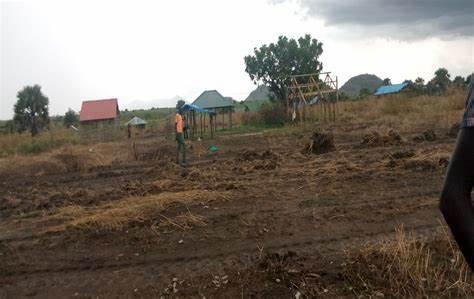As National Assembly resumes business this Month, Civil society activists are appealing to the house to prioritize the National Land Policy.
Although already developed the National Land Policy remain in the hand of the laws makers to pass it into a law.
The South Sudan Land Alliance (SSuLA), a coalition of civil society organizations and land rights advocates raised concern on Wednesday adding that continuous delay threaten the policy.
The policy, which was approved by the Council of Ministers on 27 October 2023 and tabled before the TNLA on 21 November 2024, has been in development for nearly two decades however it remains in parliament for them to pass.
Speaking to Journalists on Wednesday, Dorothy Drabuga, the chairperson of the South Sudan Land Alliance urged the government and parliament in particular to double efforts in ensuring that the Land Policy is passed into a law.
She expressed that the ongoing land-related challenges such as grabbing can easily be handle if the land Policy becomes a law.
“In advance of parliament’s reopening, SSuLA, backed by more than 50 national and international organizations and with support from the Rights and Resources Initiatives (RRI), has released an open letter urging lawmakers to pass the NLP without further delay,” she said.
According to Drabuga, a campaign titled Land for South Sudan highlights the urgent need for a comprehensive framework to resolve land disputes, secure land tenure, and promote sustainable development, particularly for Indigenous Peoples, local communities, women, and youth.
“For nearly 20 years, South Sudanese communities have waited for a land policy that safeguards their rights, reduces conflict, and unlocks development opportunities,” she expressed.
“With Parliament set to reopen, we urge lawmakers to act boldly and make the National Land Policy a top legislative priority.” She added.
“The NLP represents more than legislation. It is a pathway to peace, equity, and environmental resilience,” Drabuga stressed.
She added that Failure by the parliament to act risks deepening land disputes, discouraging sustainable investment, and worsening climate vulnerability.
With land-related conflicts persisting across the country, advocates argue that the passage of the NLP would mark a historic step toward stability and inclusive development.
For his part, Ter Manyang, Executive Director of the Centerfor Peace and Advocacy (CPA), emphasized the fact that there is a need for the creation of legal awareness and implementation of the current laws, especially where there are currently rampant land disputes.
“Many women are unaware of their rights under statutory law, and even when aware, they may face difficulties in asserting those rights due to a lack of awareness or resources,” he stated.
Recent and Disputes
Recent Fresh land dispute emerged in Lado Payam with Nyangwara-Pojulu Tijor Community calling on the state government to stop Land Demarcation in Nyamini area.
This came after a group of elders and chiefs from Bari Community declared land demarcation in Nyamini area for more than 20,000 plots of land.
The Bari community claimed that the local Chiefs. women and youth as well as county leaders have all agreed that Nyamini be allotted as Nyamini City to all South Sudanese.
In respond to the above, he called for demarcation of NyaminiCity to all South Sudanese.
A group of Nyangwara-PojuluTijor Community members met Paulino Lukudu Obede in Central Equatoria state and urged him to stop the demarcation process citing unresolved territorial dispute.
